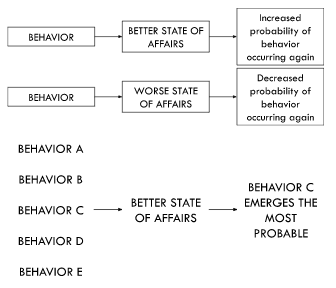Theories of Personality: B.F. Skinner
Biography
- 1904 - 1990
- Skinner’s life
- Predetermined, lawful, and orderly
- A product of past reinforcements
- 1925: Hamilton College (NY): degree in English, no courses in Psychology
- Read about Pavlov’s and Watson’s experimental work
- 1931: PhD from Harvard
- Dealt only with observable behavior
- The task of scientific inquiry: to establish functional relationships between experimenter-controlled stimulus and organism’s response
- No presumptions about internal entities – the “empty organism” approach
Operant Conditioning
- Operant Behavior
- Occurs without an observable external stimulus
- Operates on the organism’s environment
- The behavior is instrumental in securing and stimulus more representative of everyday learning
Skinner’s Theory
All we need to know in order to describe and explain behavior is this: actions followed by good outcomes are likely to recur, and actions followed by bad outcomes are less likely to recur.
Law of Effect

Skinner’s Rats
- Skinner tested out the theory of operant conditioning on rats
- Rats were placed in metal cages with a number of levels. At first the rat would nose around the cage and accidentally press the levers, an action that would cause food or water to drop into a dish. After repeating the action, the rats saw that they could receive food and water by pressing the lever. (learned this behavior)
- So, when the rats were rewarded they were conditioned to repeat this positive action to continue being rewarded
Personality from an Operant Analysis Approach
- Personality: study of unique learning history and unique genetic make-up (assuming that the person is not an identical twin) of the individual
- Operant Conditioning: establishment of the linkage or association between a behavior and its consequences
- Operant Analysis: study of the ways in which behavior is acquired, maintained, or modified by its reinforcing or punishing consequences
Operant Conditioning Techniques
- Positive Reinforcement: increasing a behavior by administering a reward
- Negative Reinforcement: increasing a behavior by removing an aversive stimulus when a behavior occurs
- Punishment: decreasing behavior by administering an aversive stimulus following a behavior (+) or by removing a positive stimulus (-)
| (+) Stimulus | (-) Stimulus | |
|---|---|---|
| Presentation | PR | PP |
| Removal | NP | NR |
Operant Conditioning
- Contingency:
- Relationship between a behavior and its consequences
- 3 Term Contingency: this kind of contingency has 3 parts:
- The events that precede the behavior
- The behavior itself
- The consequences that follow the behavior
- Discrimination: responding differently in the presence of different situational events
- Components of Operant Conditioning
- Generalization: learned response is made to a wide range of stimuli
- Extinction*:* reduction in behavior that occurs as a result of the failure to reinforce previously reinforced behavior
- Shaping: teaching a new behavior by reinforcing responses that successfully approximate it
Schedules of Reinforcement
- Reinforcement is necessary in operant behavior
- Interval Schedule:
- Reinforcement occurs after a certain amount of time has passed
- Fixed Interval: reinforcement is presented after a fixed amount of time
- Variable Interval: reinforcement is delivered on a random or variable time schedule
- Ratio Schedule:
- Reinforcement occurs after a certain number of responses
- Fixed Ratio: reinforcement presented after a fixed number of responses
- Variable Ratio: reinforcement delivery is variable but based on an overall average number of responses
Limited Effects of Punishment
- Punishment does not teach appropriate behaviors
- Must be delivery immediately and consistently
- May result in negative side effects
- Undesirable behaviors may be learned through modelling (aggression)
- May create negative emotions (anxiety and fear)
How Complex Behaviors are Learned
- Successive Approximation or Shaping
- Reinforcing behaviors as they come to approximate the desired behavior
- Superstitious Behavior
- When persistent behaviors are reinforced coincidentally rather than functionally
- Self-Control of Behavior
- Stimulus avoidance
- Self-administered satiation
- Aversive stimulation
- Self-reinforcement
Why is it Important to the Social Sciences?
- Knowing how people learn behavior is a necessity to our society so that we can control and promote the good behavior, which will benefit society as a whole
- The theory of operant conditioning helps us to be a great influence on behavior
- Helps us to understand how to improve behaviors (people with problem behaviors and criminal histories)
Behavior Modification
- Used in a variety of applied settings
- Reinforce desired behavior and extinguish undesired behavior
- Punishment is not used
Contributions of Skinner’s Behaviorism
- Shaped American Psychology for 30 years
- Goal: the improvement of society
- Strength and ramifications of his radical behaviorism